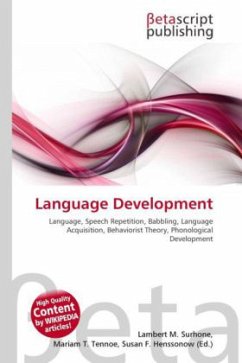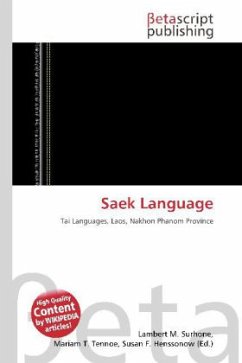
Language Development
Versandkostenfrei!
Versandfertig in 6-10 Tagen
30,99 €
inkl. MwSt.

PAYBACK Punkte
15 °P sammeln!
Please note that the content of this book primarily consists of articles available from Wikipedia or other free sources online. Language development is a process starting early in human life, when a person begins to acquire language by learning it as it is spoken and by mimicry. Children''s language development moves from simple to complex. Infants start without language. Yet by four months of age, babies can read lips and discriminate speech sounds. The language that infants speak is called babbling. Usually, language starts off as recall of simple words without associated meaning, but as chi...
Please note that the content of this book primarily consists of articles available from Wikipedia or other free sources online. Language development is a process starting early in human life, when a person begins to acquire language by learning it as it is spoken and by mimicry. Children''s language development moves from simple to complex. Infants start without language. Yet by four months of age, babies can read lips and discriminate speech sounds. The language that infants speak is called babbling. Usually, language starts off as recall of simple words without associated meaning, but as children grow, words acquire meaning, with connections between words being formed. As a person gets older, new meanings and new associations are created and vocabulary increases as more words are learned. Infants use their bodies, vocal cries and other preverbal vocalizations to communicate their wants, needs and dispositions. Even though most children begin to vocalize and eventually verbalizeat various ages and at different rates, they learn their first language without conscious instruction from parents or caretakers. In fact research has shown that the earliest learning begins in utero when the fetus can recognize the sounds and speech patterns of its mother''s voice.












